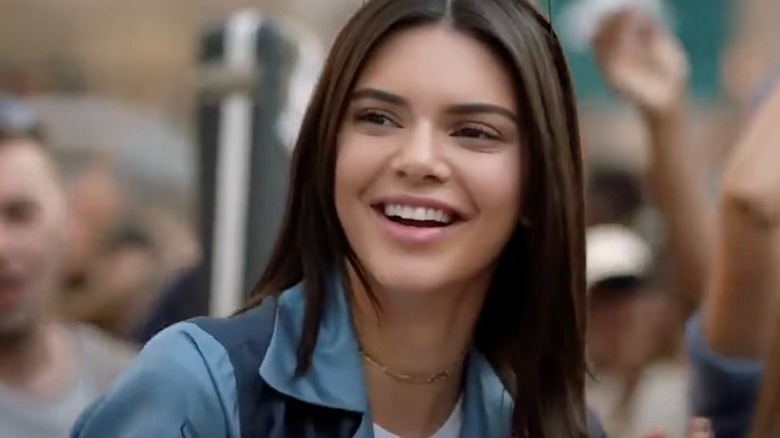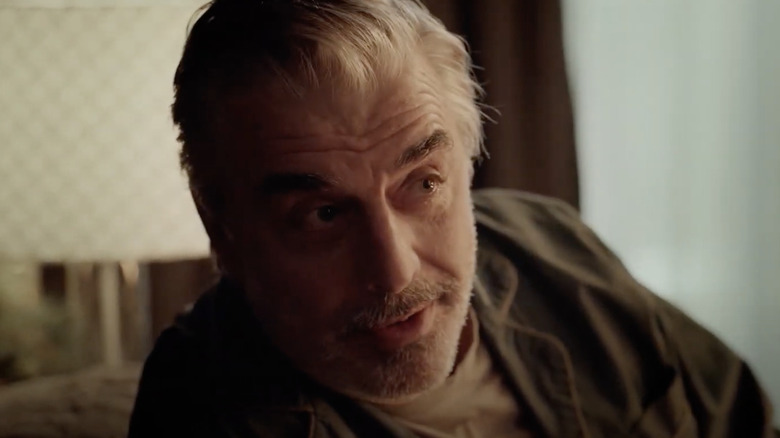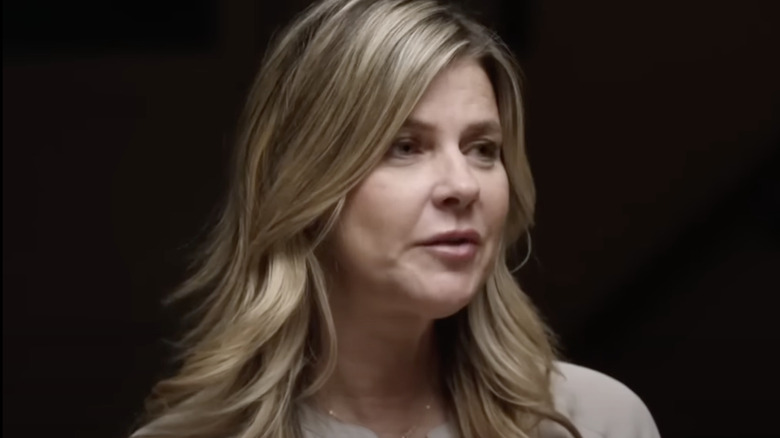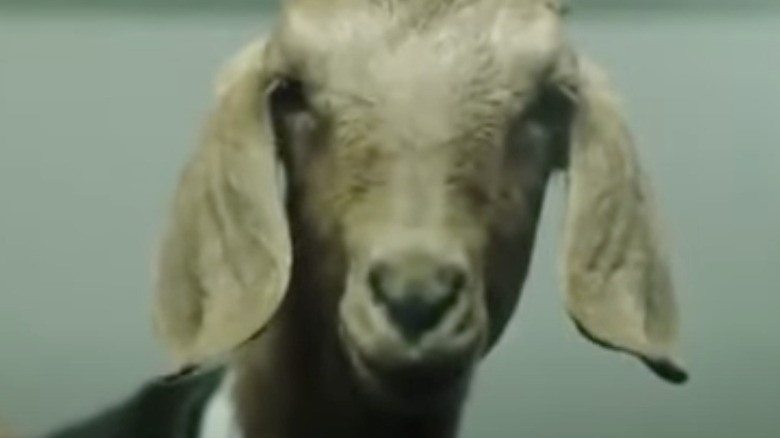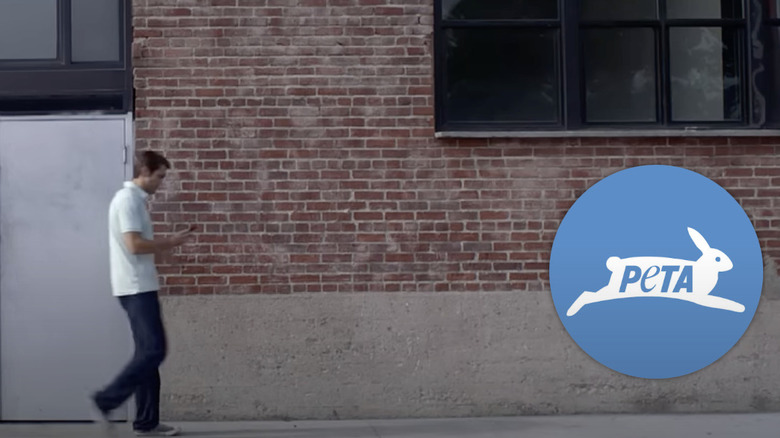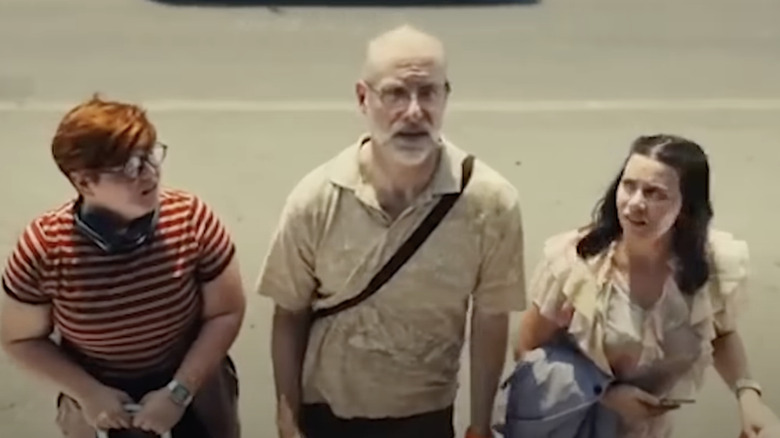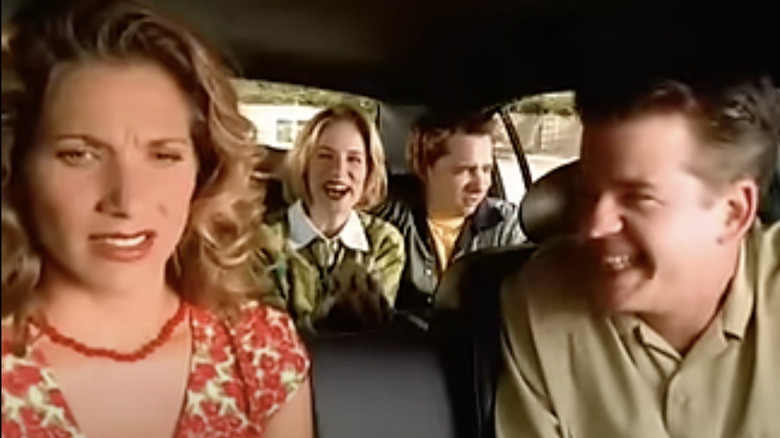Commercials That Were Banned In The United States
Advertising is one of the great inevitabilities of modern life, particularly when it comes to television. Shortly after the television was invented, early broadcasters determined that the whole endeavor should be paid for by occasional but consistent programming interruptions wherein a company spends a lot of money to inform the viewing public about its wares. Eventually, the 30-second TV commercial became the norm, prepared and produced with high production values akin to a short movie. It makes sense for commercials to be so well made — the sponsors have a rapt audience, and they employ marketing tricks that fool you every time to be as persuasive and profitable as possible.
The other side of this concept is that so many eyeballs view major ads all at once that these small pieces of pop culture endure intense scrutiny. Whenever a commercial is deemed controversial, strange, or offensive, it may not even make it to the air (or YouTube), or, if it does, it may not be there for long. Here are some of the most eye-popping TV ads of all time — which broadcasters, paid sponsors, and viewers all decided should never air on American television or video hosting sites, not once, and not ever.
Chris Noth's Peloton ad
In December 2021, HBO Max launched "And Just Like That..." — the highly anticipated revival of its millennium-era "Sex and the City," a TV show with a cast who couldn't stand their co-stars. In order to get happily married main character Carrie Bradshaw single and searching once more, writers killed off her husband, Mr. Big. In the first episode of "And Just Like That...," the character portrayed by Chris Noth completes his 1,000th session on a Peloton Indoor Exercise Bike, has a heart attack, and dies on the floor of his bathroom.
Rather than distance itself from the scene that cast its product in a bad light and made them seem deadly, Peloton embraced its big pop cultural moment, and within a week had produced and premiered a humorous commercial starring Noth. The ad features Noth chatting with a Peloton instructor, and narrator Ryan Reynolds (whose company, Maximum Effort, produced the ad) quipping, "And just like that... he's alive." Noth adds "To new beginnings" before he heads back to his Peloton bike while Reynolds delivers some facts about how exercise is good for heart health.
A few days after the commercial debuted, The Hollywood Reporter published a story based on two separate, unrelated accounts from two women accusing Noth of sexual assault. The incidents allegedly took place in 2004 and 2015. The commercial was only viewable for about four days before Peloton withdrew it from circulation.
A financial planning ad featuring a would-be presidential assassin
In 2022, financial services company BlackRock Inc. produced a commercial at a real high school in Pittsburgh, Pennsylvania. In promoting its management of pension plans for public school instructors, the commercial depicts a day in the life of Brian DeLallo, an advanced economics teacher at Bethel Park High School. As DeLallo narrates about financial health and the importance of preparing for the future, he's seen working with students, and one young man wearing a hooded sweatshirt and glasses is seen twice. That student was Thomas Matthew Crooks, who in July 2024 was identified as the gunman who was shot and killed by Secret Service agents when he attempted to assassinate former President Donald Trump at a campaign rally in Butler, Pennsylvania.
Within two days of the violent incident, BlackRock removed the two-year-old commercial from all official distribution channels. The statement also explained how Crooks came to appear in the ad: "In 2022, we ran an ad featuring a teacher from Bethel Park High School, in which several unpaid students briefly appeared in the background, including Thomas Matthew Crooks. We will make all video footage available to the appropriate authorities, and we have removed the video from circulation out of respect for the victims," the company said in a statement reported by Fox Business.
Ted Cruz campaign ad featuring an adult film actor
Texas-representing U.S. Senator Ted Cruz mounted a presidential campaign in 2016, positioning himself as a very conservative candidate and aligning himself with wholesome institutions. The soft-core adult film industry probably wouldn't fit in with Cruz's stated values, so it was a legitimate problem for his campaign when it was discovered that a vote-for-Cruz commercial featured Amy Lindsay, an actor who specialized in nudity-heavy erotic dramas that aired on cable television in the 1990s and 2000s. Among her resume entries: "Confessions of a Lap Dancer," "Confessions of a Call Girl," "Erotic Confessions," and "Sin City Diaries."
Lindsay only appeared briefly in the 30-second Cruz campaign ad, titled "Conservatives Anonymous," which took on the guise of a group therapy session where voters complained about rival Republican Marco Rubio. Upon learning of Lindsay's past, the Cruz campaign removed the ad from use. "The actress responded to an open casting call. She passed her audition and got the job. Unfortunately, she was not vetted by the production company," spokesperson Rick Tyler told BuzzFeed News. "Had the campaign known of her full filmography, we obviously would not have let her appear in the ad."
A Holiday Inn ad featuring a transgender woman
Holiday Inn Worldwide spent $1 billion to renovate its many motels in the late 1990s, and it announced the finished products with a 1997 Super Bowl ad. Set during a high school reunion, a woman turns heads as she passes through while a narrator discusses her various cosmetic surgery procedures. Then a reunion attendee realizes that the mystery woman is his old friend "Bob Johnson." "It's amazing the changes you can make for a few thousands dollars," the narrator quips (via GoUpstate) as the man visibly cringes.
The motel commercial made a punchline out of gender transition, but that's not why people complained in 1997. Reverend Al Phillips, president of the South Carolina Baptist Convention, proposed a boycott of the chain. "Holiday Inn wants to get our attention with this ad and reconsider them in a different light. They certainly have succeeded," Phillips said. "I know a lot of churches have done a lot of business with Holiday Inn through the years, including our church, and we're going to reconsider that now in light of this type of ad and the kind of values, or lack of values, that this ad manifests." Holiday Inn agreed to no longer air the commercial. "Our sole intent with our Super Bowl advertisement was to communicate the significant renovation currently underway in Holiday Inn hotels," company executive John Sweetwood said. "We understand the ad has offended some people. That was never our intention."
Kendall Jenner's Pepsi ad
On April 4, 2017, Pepsi unveiled a commercial starring Kendall Jenner, a member of the Kardashian family, reality TV star, model, and social media influencer. The ad didn't feature Jenner simply drinking and enjoying a Pepsi. It takes place in a big-city protest of indeterminate cause, as mostly young adults carry signs gently urging change and dialogue while surrounded by stern-looking law enforcement officers. Things could take a turn to violence at any second, it seems, until Jenner emerges from the crowd and hands a can of Pepsi to a police officer. He smiles, the crowd happily erupts, and the tension is released, as if to say that Jenner's act has solved whatever social ill the protesters were upset about.
A YouTube clip of the ad instantly went viral, and Pepsi earned so much criticism that it took down the commercial and canceled its distribution within a day of the debut. The main argument held that the commercial liberally utilized imagery from anti-police brutality and Black Lives Matter protests, and it diminished the importance of those causes by using them for clout or to suggest that a soda could resolve such weighty issues. "Pepsi was trying to project a global message of unity, peace, and understanding. Clearly, we missed the mark and apologize," the beverage maker said in a statement (via The New York Times).
Tyler, the Creator's Mountain Dew material
PepsiCo hired the hip-hop and comedy collective Odd Future for a run of 2013 Mountain Dew commercials. Tyler, the Creator, a member of the group, directed a few of the ads, in which he also voiced the main character, Felicia the Goat, portrayed otherwise by a real animal. In one of the spots, Felicia becomes irate when a restaurant doesn't have any Mountain Dew to serve, and she attacks a server. In another, Felicia is stopped by a police officer for a "DewUI," a brand-promoting pun on DUI (driving under the influence) and takes off running. Another ad depicts Felicia as part of a police lineup staged to catch the culprit who assaulted the server in the first commercial. Felicia, standing in a row of Black men, menacingly insults the woman, ominously intoning "snitches get stitches."
The backlash was swift and significant. Syracuse University professor Boyce Watkins led the charge, labeling one of the spots "arguably the most racist commercial in history" in an essay for Your Black World (via NPR). PepsiCo took the offending material off of its online outlets. "We understand how this video could be perceived by some as offensive, and we apologize to those who were offended," a Pepsi representative said in a statement to AdWeek.
PETA's provocative commercials
The nonprofit animal rights organization People for the Ethical Treatment of Animals, or PETA, was prepared to pay about $2.9 million to reach around 100 million Super Bowl viewers. In January 2009, PETA reported that NBC had turned down its fully produced commercial that promoted a vegetarian lifestyle, claiming it "depicts a level of sexuality exceeding [the network's] standards." The potential Super Bowl commercial included footage NBC requested to be deleted, such as scenes of a woman licking a pumpkin and an eggplant and then fondling herself with asparagus and broccoli.
Seven years later, PETA received another rejection for a commercial intended to air during a Super Bowl. The spot, called "Last Longer," contrasted two couples engaged in intimate acts, one with a meat-eating man and the other with a vegan. The meat-eater's encounter ends quickly due to his implied lack of stamina, while the vegan is able to perform for a prolonged period of time. Broadcasters said that the ad was too graphically sexual to air on network TV.
An Apple spot that misrepresented Thailand
In 2019, Apple started producing short films that served as advertisements for its various high-tech gadgets and software programs. Featuring a group of four clever Apple workers who use their employer's products to get complicated work tasks accomplished, a 10-minute-long 2024 installment called "The Underdogs: OOO (Out of Office)" found the characters in Thailand, seeking to locate and contract with a box factory that could handle a massive job. In the process, they absorb a lot of Thai culture, like riding in a tuk-tuk (a rickshaw) and spending a night in a rundown hotel.
Apple distributed the ad by linking to the video on its social media accounts. It immediately started to field criticism that the ad was woefully out of date in its cliche-filled depiction of Thailand as a rural and antiquated country. "Our intent was to celebrate the country's optimism and culture, and we apologize for not fully capturing the vibrancy of Thailand today," Apple admitted in a statement, according to Campaign. After racking up 6 million views, the video went private on Apple's YouTube page.
A chips commercial featuring Ashton Kutcher in brownface
The company that makes Popchips attempted a viral marketing campaign in 2012 with a series of advertisements in which "Two and a Half Men" star Ashton Kutcher monologued as different snack-munching guys in faux dating profile videos. Among Kutcher's characters: Darl the fashionista, Swordfish the hard-partying Southern man, Nigel the British marijuana enthusiast, and Raj, a producer of movies in the Indian "Bollywood" scene. To portray Raj, Kutcher wore extensive skin-darkening makeup, donned traditional Indian clothing, and spoke in an intended-to-be-comical approximation of an Indian accent.
Speaking perhaps to the Ashton Kutcher curse no one seems to notice, the ads indeed went viral, but not for the reasons that the people at Popchips had hoped. Many people found the spot to be more than a little racist. "I can't imagine I have to explain this to anyone in 2012, but if you find yourself putting brown makeup on a white person in 2012 so they can do a bad 'funny' accent in order to sell potato chips, you are on the wrong course," tech writer Anil Dash wrote (via Vulture). In response, Popchips took down all of the Kutcher videos from YouTube and then restored all of them except the one about Raj.
An ad for beepers that ran out of gas
Among the popular things from the 1990s you don't see anymore: beepers. In 1999, Smart Beep, a company that sold access on the cheap to the telephonic services that made the pocket-sized paging devices work, prepared a commercial and submitted it to air as part of that year's Super Bowl programming. "Blind Date" was a comedy sketch that showed something "stupid" to contrast with the "smart" decision of buying a beeper. In the spot, a man happily walks his female date to his car, and she uses a moment of privacy to loudly release a hefty bit of flatulence. The guy enters the car on the driver's side and introduces the lady to the couple in the backseat, whom she hadn't noticed.
Super Bowl broadcaster Fox took a look at the Smart Beep commercial and rejected it from airing, finding the idea of flatulence to be a little too hot for TV.
An ad with talking pandas that crossed a line
The broadcast of Super Bowl XLII in February 2008 included multiple commercials for and produced internally by Salesgenie.com, an Omaha-based retail business consulting agency. All of the ads were minimally animated, and one revolved around a pair of talking pandas who utilized Salesgenie's services. Because real giant pandas traditionally come from China, Salesgenie's umbrella company's lead executive — and its commercial script writer — Vinod Gupta made his cartoon pandas come from that place, too. "They don't speak German," he told The New York Times. They did, however, speak grammatically incorrect English, and with a thick, broad, stereotypical Asian accent.
After receiving an unspecified but high number of complaints over the perceived racist undertones of the ad, Gupta announced that his company, InfoUSA, would take it off the air. "We never thought anyone would be offended," he said. "If I offended anybody, believe me, I apologize."
A car commercial about a depressed robot
The American automotive manufacturing industry makes extensive use of robots, and a fictional one took the spotlight in a 2007 Super Bowl commercial for General Motors touting a newly instituted extended warranty program. After it messes up its assembly-line job, the robot gets fired, takes jobs as a sign spinner and a fast food drive-through speaker, and is so upset over losing its GM employee status that it plunges to its death after leaping from a bridge. The tagline, per MarketingWeek: "GM's 100,000-mile warranty — it's got everyone obsessed with quality."
The whole thing turns out to be the robot's bad dream, but the ad prompted the American Foundation for Suicide Prevention to publicly criticize the commercial as being hostile to those whose lives were touched by suicide. GM quickly removed the original version of the spot from the airwaves and its internet channels and promised to run an edited version that didn't include a robot's suicide.
If you or anyone you know has been a victim of sexual assault or is struggling or in crisis, contact the relevant resources below:
Visit the Rape, Abuse & Incest National Network website or contact RAINN's National Helpline at 1-800-656-HOPE (4673).
Call or text 988 or chat 988lifeline.org
